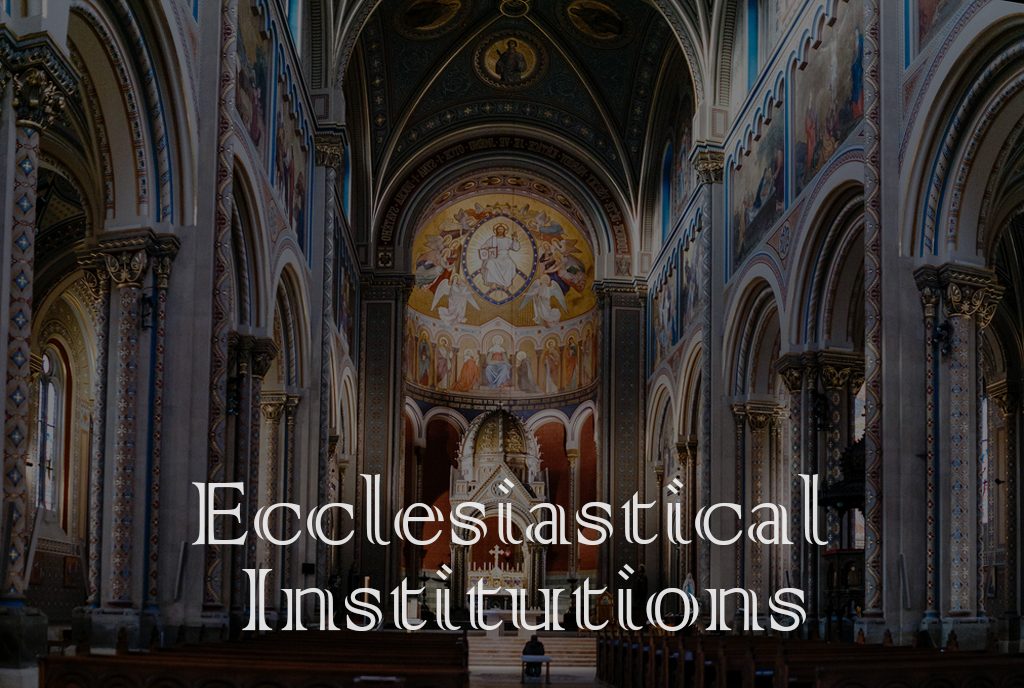
Ecclesiastical Institutions
Pius X Philosophy College, Piusnagar, Idduki
A new residential Philosophy College for the Students of the Province was started in 1965-66 at Piusnagar near Kanthaloor in the Idukki district. The college was run by our professors, hailing from our own province. The huge building, the biggest in the whole district of Idukki at that time was the result of strenuous efforts of Fr. Francis Gregory OCD, then the Provincial of the fledgling St. Pius X monastery. The college was close in 1971 and shifted to Sacred Heart Philosophy College, Aluva due to the lack of travel facilities and other inconveniences for the supply of the teaching staff.
Sacred Heart Philosophy College, Aluva
As stated earlier the Philosophy College started at Pius Nagar could not be continued there and so finally it was established in Alwaye at our Sacred Heart monastery in a separate block constructed for the same. But for their studies, both the Theology and Philosophy students were frequenting the St. Joseph’s Pontifical Seminaries of Mangalapuzha and Carmelgiri. The Provincial Chapter of 1978 decided that a commission should study about the education and formation of the students after the novitiate. Basing on this report, the Provincial Council decided that we should have a Philosophy College of our own for our students, and they should follow, besides the ecclesiastical syllabus, the secular university syllabus and pass BA degree at the end of three years of philosophy course. And it was also decided that BA is obligatory for our students to get admission to theology course. Both these decisions were led to the growth of Sacred Heart Philosophy College on June 1,1979.
In 1994, the Sacred Heart Philosophy College open to all religious came into existence. In 2003, Atmadharsan, a multipurpose annex to Sacred Heart Monastery, was built on the bank of Periyar River.
Jyotir Bhavan, Institute of Theology
In the sphere of promoting charism and specific apostolate, the monumental contribution of the Province is the Institute of Spirituality, Jyotir Bhavan. His Eminence Cardinal Angelo Rossi, the then Prefect of the Congregation for the Evangelization of Peoples erected this Institute on 3rd July 1980, on an official visit to Kerala. Formally the institute began to function on 1st August 1980, with the inauguration of the Institute by His Eminence Cardinal Joseph Parecattil in the presence of His Grace Archbishop Joseph Kelanthara, His Excellencies, the Bishops and eminent men. And then onwards the Institute served the Church of Asia and of India in particular by conducting the Diploma Course in Spirituality. In the year 1982, the Course was affiliated to the Pontifical Institute of Spirituality, “Teresianum” Rome.
In 1994, a four-year Theology Course (B.Th) was inaugurated and it was opened for religious men. After two years it was affiliated to the Pontifical Faculty of Theology, “Teresianum” Rome. In 1998, the B.Th Course, which was open to religious men, was opened to religious women too, and in 2004, to the educationally qualified laity as well. In 2004, began the process of aggregating Jyotir Bhavan to “Teresianum” in view of begining M.Th in Spiritual Theology. In 1999 began the publication of the Journal, “Jyotir Dhara: Journal of Religion and Spiritual Life.”
In 2004, Carmelite Study Center for Asia (CSCA) was inaugurated. The main aim of CSCA is to make known to the people of all walks of life and religions the rich heritage of the Carmelite way of life. This shall be carried out in three directions: A Diploma Course on Carmelite Spirituality, short courses and seminars, Publications and Promotion of Carmelite Library.
Besides all these, Jyotir Bhavan offers week-end course in theology (for all), one month lectures on Consecrated Life (women religious), two-year course on Consecrated Life on every Thursday (participants Novices) and modern language courses.The Institute has a publishing center which in 1985 was called Jyotir Bhavan Publications, in 1989 Jyotir Dhara Publications and in 1909 as Jyotir Dharma Publications. In its 25th year it has to its credit about 76 books. Every year Jyotir Bhavan has an average of 300 students in its various departments.
Share on Facebook Share on Twitter Share on Pinterest